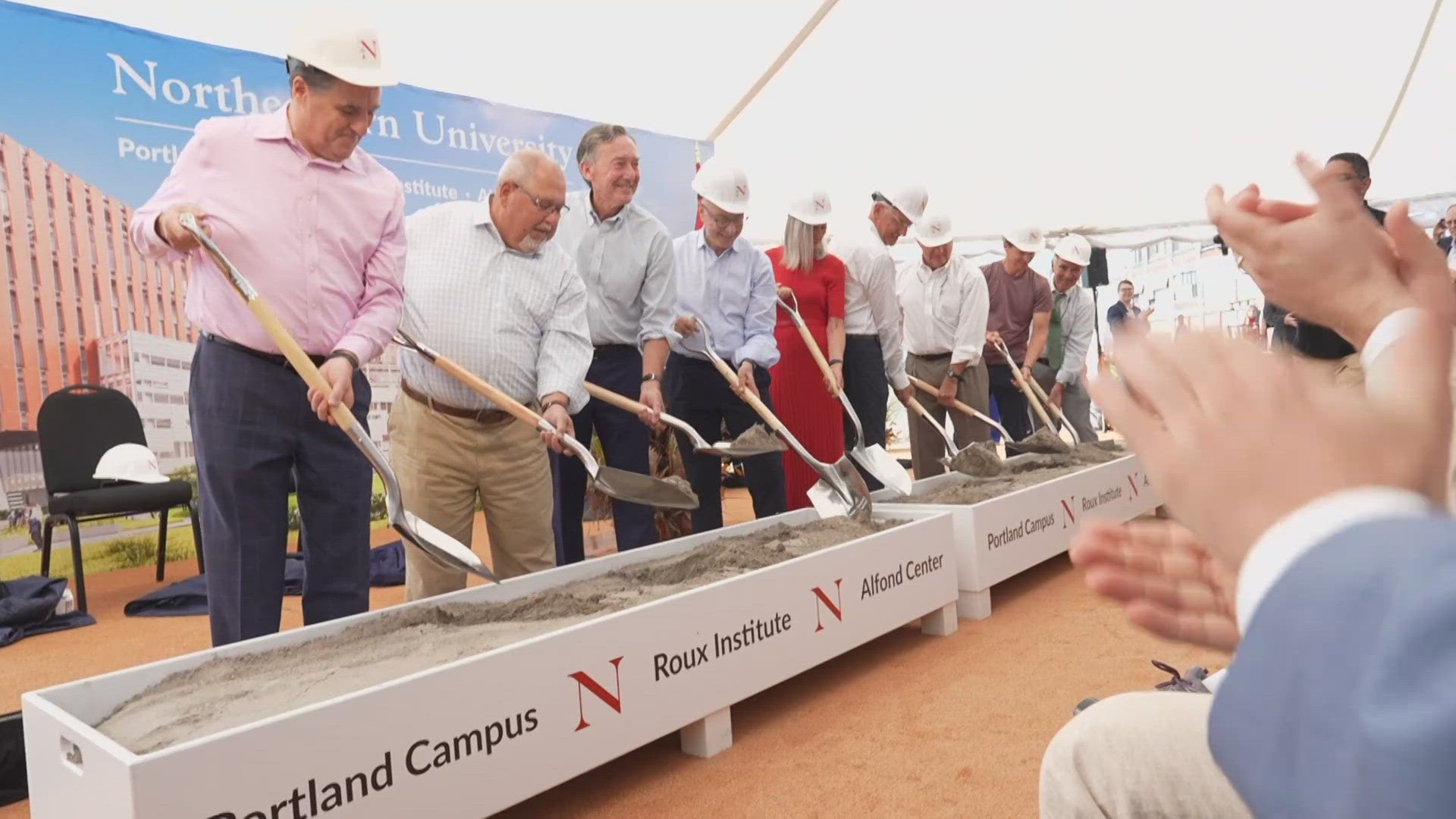PORTLAND, Maine — What's old is new again on Portland's waterfront.
Mayor Mark Dion shed his suit jacket and grabbed a shovel on the morning of Sept. 13, joining a leadership group from Northeastern University as they ceremoniously broke ground on the long-anticipated, much-debated new campus for the school's Roux Institute.
The institute is the brainchild of couple David and Barbara Roux.
"We hope this spectacular, new campus can be an expression of our unwavering faith that Maine and its citizens have a bright future," David Roux said at the groundbreaking.
He made his fortune as an entrepreneur and investor in the tech industry. The Rouxs founded the institute in 2020 and Portland-based company Wex made room for the school's students on its property. Since then, the Roux has taught specific, tech-forward graduate programs. All the while, the school and the school's namesakes had their eyes on a permanent campus.
In 2021, and with a $100 million investment from the Rouxs, Northeastern bought the land of the former B&M Baked Beans plant, built in 1913, and a harborside fixture for motorists traveling along I-295.
In the years that followed, school officials joined mandatory public comment meetings to lay out their plans for the site and hear feedback. With 2,000 students and a few hundred faculty members expected upon opening, locals consistently raised concerns over traffic in the East Deering neighborhood.
School representatives promised they would provide bus passes to each student and employee, encourage them to use transportation other than driving, help with new traffic lights and speed bumps, and participate in a mandatory traffic study within one year of opening.
Chris Mallett is the chief administrative officer of the institute, and spoke with us after the groundbreaking.
"The feedback that we have from the people who live most immediately adjacent to the site has informed the design of what we announced today," Mallet said.
Meanwhile, according to Northeastern, the Harold Alfond Foundation added another $100 million and, in 2023, crews began demolishing parts of the old plant, leaving the most prominent brick building intact to be renovated and repurposed.
After more talks about traffic, U.S. Secretary of Transportation Pete Buttigieg visited the site in August and announced a 25 million dollar grant that would alter a section of I-295 in an attempt to ease traffic to and from the institute.
"[We're] just making sure the people—the human capital that's gonna power this place—can literally get to where they need to be and safely, and in a way that's integrated with the life of East Deering and Greater Portland," Buttigieg said.
The school released renderings of the campus to be, which includes a reimagined baked bean building, a 245,000-square-foot research building, a 625-bay parking garage, a trail connecting other nearby bike and pedestrian trails, and a pier that will be open to the public.
The campus will stand tall on the horizon—taller than the bean plant did. It will almost certainly add traffic to Portland's streets. And so, the looming question is, what will Roux do for you? And for the rest of us Mainers?
State Chamber of Commerce Executive Director Patrick Woodcock attended the groundbreaking and met with us afterward.
"Ultimately, I think the success for Maine will be judged on not how many students come through here but, really, how many students remain here and start companies, and integrate into the Maine economy, into Maine companies going forward," Woodcock said.
The institute boasts partnerships with 200 Maine-based businesses, organizations, and municipalities. The school will benefit Mainers, Mallett said, by attracting local college graduates into their programs before they potentially decide to leave the state. Then, the school partners students with these businesses, filling and sometimes creating positions for when they earn their degrees. And, they aim to leverage all of this to help other Mainers.
"These include the largest employers of Maine, but they also include K-12 school districts, nonprofits, the state of Maine, the city of Portland," Mallett explained. "And the ways that we work with them include deploying the research and graduate students that are working at the institute, in service of the problems they’re trying to solve."
In total, the project carries a $500,000,000 price tag, as of this writing, and is expected to open in 2027.

